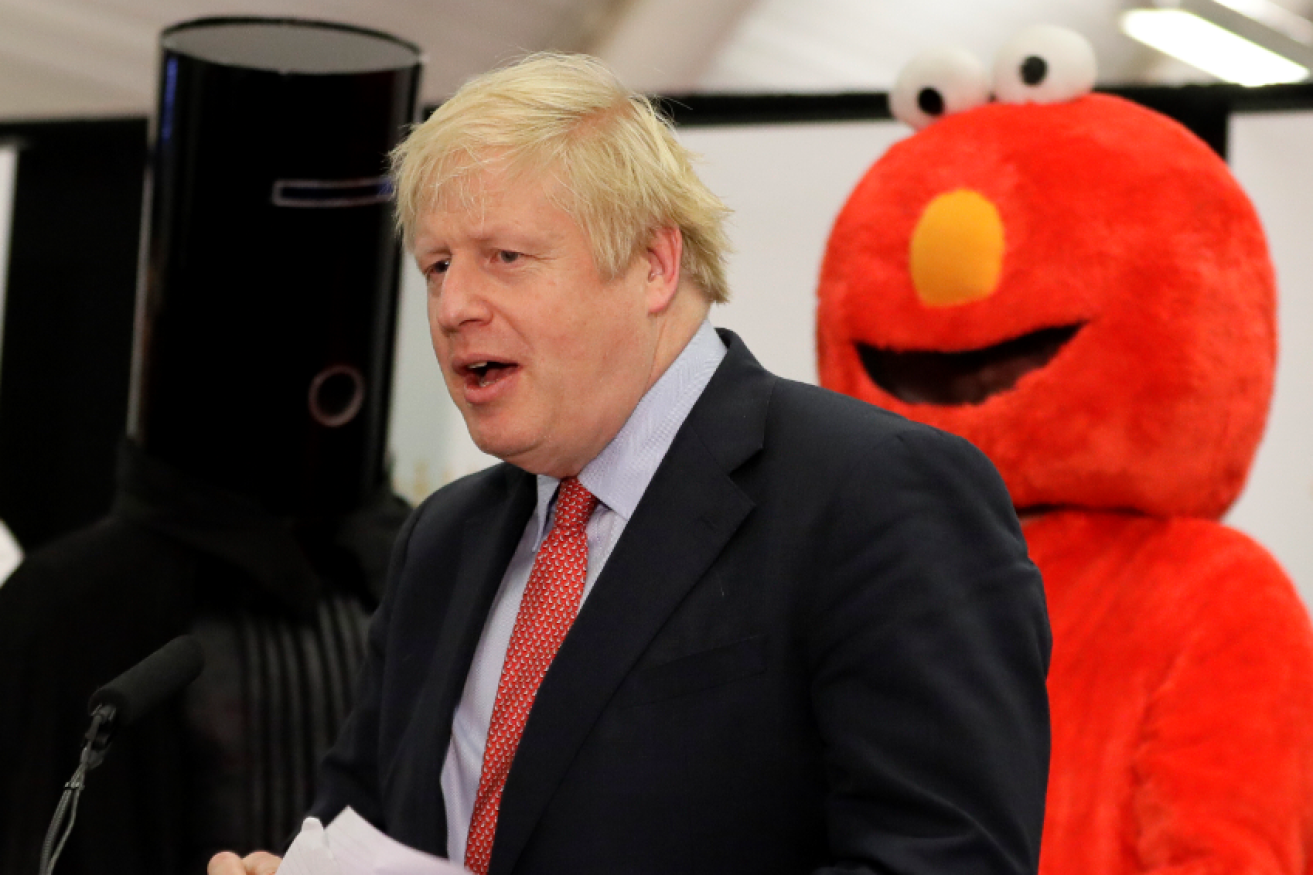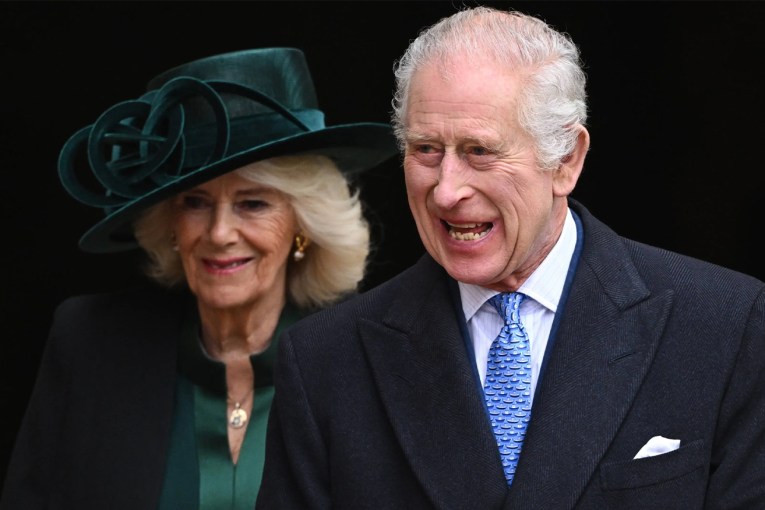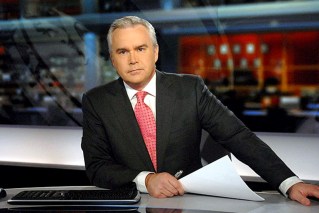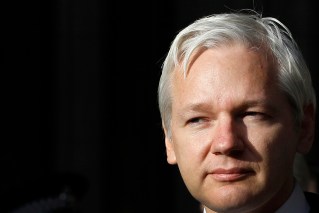The end of the UK? For Boris Johnson, winning the election was the easy bit


Boris Johnson hears he has increased his vote in an election also contested by Lord Buckethead (left) and Elmo of the Monster Raving Loony Party. Photo: AP/Kirsty Wigglesworth
In one day of voting the British public has wrought changes that will last for decades and resonate well beyond the normal electoral implications of the Conservative Party thrashing the hard-left Labour of Jeremy Corbyn.
Those long-term transformations are much more significant than the immediate political fall-out of Labour suffering its worst election result since 1935, which included Corbyn quickly conceding that he will have to step down as Labour leader.
On top of that, Liberal Democrat leader Jo Swinson lost her own seat and Prime Minister Boris Johnson won such a whopping majority that after nine years in office his party is well-placed to rule for another two terms or 10 years.
For one thing, it is now certain for the first time that Britain will soon leave the European Union. Three and a half years after the UK voted narrowly for Brexit in a referendum, the possibility of a second vote on the issue has finally been killed off and the world’s most successful political and economic union of nations is about to lose one of its most important members.

Voters will soon be seeing the back Of Jeremy Corbyn as Labour leader. Photo: AAP
Johnson was talking through his hat when he promised voters that a Conservative victory would “Get Brexit Done” and allow the nation to quickly move on from all that frustrating EU nonsense.
The truth is that the real wrangling with the EU over the future relationship has barely begun, with the long-term economic damage and diplomatic costs of Brexit are yet to come.
There is now no way back, and within weeks the House of Commons will pass legislation to leave the 28-nation union after a transition period that Johnson says will end within a year.
The other historic consequence of this election is its threat to Britain’s own union, symbolised by the merging of England and Scotland in 1707.
The election of 2019 has made it unlikely that there will be many more general elections in which England, Scotland, Wales and Northern Ireland choose a shared government.
Historians will probably look back on this week’s election as a huge step in first Scotland and then Northern Ireland exiting the United Kingdom, leaving a nation that will even need to change its name as it will consist of just one kingdom (England) and one principality (Wales).
Visualising the thinning of Labour's 'Red Wall'.
Full results;https://t.co/pHAmhckPls pic.twitter.com/lRuwxIH2Bj
— Britain Elects (@BritainElects) December 13, 2019
The simmering campaign by the Scottish National Party to turn the 20-year-old Scottish Parliament from something akin to an Australian state parliament into the fully-fledged legislature of an independent nation took an enormous leap forward because of the conflicting verdicts cast by voters on each side of the Scottish-English border.
Johnson is understandably casting his anticipated majority of 78 seats in the 650-seat House of Commons as a national mandate for Brexit.
At the same time the Scottish National Party (SNP) is presenting its own triumph north of the border, where it gained 13 MPs to hold 48 of the 59 available seats, as a mandate for not only doing the exact opposite and rejecting Brexit but also for holding a re-run of its failed 2014 referendum on independence.

Scottish National Party leader Nicola Sturgeon hasd good reason to celebrate. Photo: AAP
“I very reluctantly accept that Boris Johnson has a mandate to take England out of the EU, but he does not have a mandate to take Scotland out of the EU,” SNP leader Nicola Sturgeon declared while votes were still being counted.
”I have a renewed and strengthened mandate to offer the people of Scotland a choice over their future and that mandate has to be respected.”
Johnson is determined not to authorise such a new independence referendum for fear of being the PM who loses the union, given that the formal name of his party is the “Conservative and Unionist Party”.
But the SNP’s momentum will certainly be fuelled by an Eton-educated PM seen as an English toff from Oxford who is about to impose Brexit on Scots who voted overwhelmingly against it.
Sturgeon is reluctant to hold an unauthorised referendum on independence, knowing that Spain would then veto Scotland rejoining the EU due to Madrid’s fear of a precedent being set for Catalan independence.
The Scotland-Spain nexus
But as Sturgeon warned after the election, there is a limit to how long Johnson could refuse to allow the Scots to vote on the issue, especially if the SNP make that a central theme in the 2021 Scottish parliamentary elections at precisely the time that Brexit is disrupting trade with Europe.
“Scotland can’t be kept in the UK against its will, it can only be by consent,” Sturgeon insisted.
The prospect of Northern Ireland holding its own break-away referendum to merge in the medium-term future with the Republic of Ireland was also put firmly on the table by the result of this election.
It’s not just Scotland pointing in a different direction to the rest of the UK today, it’s also Northern Ireland – where there are more nationalist MPs than unionist MPs for the first time.#UKElection #GeneralElection2019
— James Melville 🚜 (@JamesMelville) December 13, 2019
For the first time ever the Protestant parties that are committed to maintaining the union with the rest of the UK failed to win a majority of the province’s 18 House of Commons seats, with the surge of their mainly Catholic rivals symbolised by the unseating of Nigel Dodds, the Westminster leader of the pro-Brexit Democratic Unionist Party.
Northern Irish voters joined the Scots in voting no to Brexit in 2016, and many are furious that Johnson plans to erect new regulatory barriers between their province and both the EU and the rest of Britain.
Former Conservative Chancellor George Osborne said the DUP had scored “a spectacular own goal” on Brexit when it held the balance of power after the 2017 general election because under Johnson “they have got a new regulatory border in the Irish Sea that makes a federated Ireland more likely.”
“I think Northern Ireland is now on track over the next 10-15 years – for all sorts of reasons, but accelerated by Brexit – to some kind of Irish federation,” Osborne said.
The voting population of Northern Ireland is already set for a demographic swing to the faster-growing Catholic community, with its pro-Irish nationalist leanings, and Johnson’s victory in the December 2019 “Brexit election” will only accelerate the push for a “border poll” on unification with the republic.








